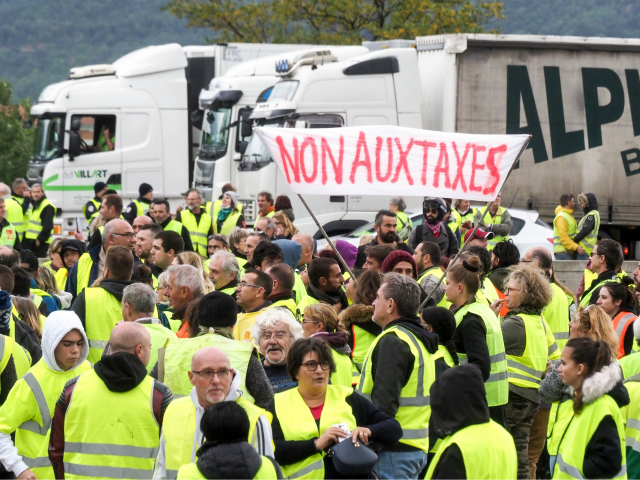280,000 protesters known as “Yellow Vests” took to the streets of France this week to protest the government’s increased carbon tax, and they used social media to organize these protests.
What began as peaceful protests this week over the recently enforced policies of French President Emmanuel Macron turned violent as protesters became increasingly unruly. So far over 2,000 rallies throughout the city have taken place with 400 injured and one left dead after being hit by a moving vehicle. The Verge summarized a number of articles discussing the Yellow Vests and how they organized their protests via social media.
According to multiple French sources, Facebook was the primary platform used to organize the protests. French writer Frederic Filloux described some of the group’s methods stating:
Two weeks ago, more than 1,500 Yellow Vests-related Facebook events were organized locally, sometimes garnering a quarter of a city’s population. Self-appointed thinkers became national figures, thanks to popular pages and a flurry of Facebook Live. One of them, Maxime Nicolle (107,000 followers), organizes frequent impromptu “lives”, immediately followed by thousands of people. His gospel is a hodgepodge of incoherent demands but he’s now a national voice. His Facebook account, featuring a guillotine, symbol of the French Revolution and the device for death penalty until 1981, was briefly suspended before being reinstated after he put up a more acceptable image. Despite surreals, but always copious lists of claims, these people appear on popular TV shows. Right now in France, traditional TV is trailing a social sphere seen as uncorrupted by the elites, unfiltered, and more authentic.
Bloomberg writer Leonid Bershidsky stated in a column that Facebook’s decision to promote posts from groups in the News Feed and give more power to group administrators may have led to further protests across the city:
There’s nothing democratic about the emergence of Facebook group administrators as spokespeople for what passes for a popular movement. Unlike Macron and French legislators, they are unelected. In a column for Liberation, journalist Vincent Glad suggested that recent changes to the Facebook algorithm – which have prioritized content created by groups over that of pages, including those of traditional media outlets – have provided the mechanism to promote these people. Facebook Chief Executive Officer Mark Zuckerberg thought he was depoliticizing his platform and focusing on connecting people. That is not what happened.
“Facebook group admins, whose prerogatives are constantly being increased by Zuckerberg, are the new intermediaries, thriving on the ruins of labor unions, associations or political parties,” Glad wrote.
This isn’t the first time that Facebook has been used as a tool to organize protests or political movement. Facebook attempted to shut down one of the largest political support networks for Brazilian President Jair Bolsonaro. Reuters reported in October that Facebook has shut down 68 pages and 43 accounts linked to the Brazilian marketing group Raposo Fernandes Associados (RFA) for violating the website’s rules related to spam. The Brazilian newspaper O Estado de S. Paulo claimed that the marketing group has been one of the biggest support networks for right-wing Brazilian Presidential Candidate Jair Bolsonaro.
Facebook said that RFA created Facebook pages using multiple accounts or fake accounts with the same name and posted multiple clickbait style links which lead to “ad-farming” websites. Facebook said in a statement: “Our decision to remove these pages was based on the behavior of these actors – including using fake accounts and repeatedly posting spam – rather than on the type of content they were posting.”
Facebook has claimed that the removal of RFA’s pages and accounts had been part of the many actions they have taken “to prevent bad actors from interfering with Brazil’s elections on Facebook.” Brazils leftist presidential contender, Fernando Haddad of the Workers Party, has claimed that the Facebook-owned messaging app WhatsApp was being used to spread spam and misinformation surrounding the election.
Facebook was also blamed for a rise in violence against the Rohingya Muslim minority in Myanmar and was forced to ban Myanmar’s army chief and other military officers from their platform. The company said in a statement: “We are banning 20 Burmese individuals and organizations from Facebook — including Senior General Min Aung Hlaing, commander-in-chief of the armed forces,” adding that this decision was made in an attempt to prevent the military officials from using Facebook to “further inflame ethnic and religious tensions.”
Protests are reportedly still ongoing in France.

COMMENTS
Please let us know if you're having issues with commenting.